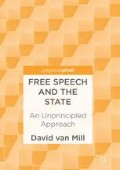Abstract
The idea that speech should be afforded special protection can be explained by a presupposition in favour of speech, and philosophers have searched for a principle that justifies this exalted position. There are four prominent arguments for why speech is special: (1) free speech is a human right; (2) it fosters truth; (3) it promotes autonomy; and (4) it fosters democracy. This chapter demonstrates that these arguments fail to provide the required justification for a “principled” defence of free speech.
Access this chapter
Tax calculation will be finalised at checkout
Purchases are for personal use only
Bibliography
Alexander, Larry. 2005. Is There a Right of Freedom of Expression? Cambridge: Cambridge University Press.
Baker, Edwin, C. 1992. Human Liberty and Freedom of Speech. New York: Oxford University Press.
———. 2009. “Autonomy and Hate Speech”. In Extreme Speech and Democracy, eds. Ivan Hare and James Weinstein, 139–157. Oxford: Oxford University Press.
Boonin, David. 2011. Should Race Matter: Unusual Answers to the Usual Questions. New York: Cambridge University Press.
Bork, Robert. 1971. “Neutral Principles and Some First Amendment Problems.” Indiana Law Journal 47/1: 1–35.
Brison, Susan. 1998. “The Autonomy Defence of Free Speech.” Ethics 108/2: 312–339.
———. 2007. “Book Review: Is There a Right to Freedom of Expression?” Law and Philosophy 27: 97–104.
Conly, Sarah. 2013. Against Autonomy: Justifying Coercive Paternalism. Cambridge: Cambridge University Press.
Dworkin, Ronald. 2009. “‘Foreword.” In Extreme Speech and Democracy, eds. Ivan Hare and James Weinstein, v–ix. Oxford: Oxford University Press.
Feral, Rex. 1983. Hit Man: A Technical Manual for Independent Contract Killers. Colorado: Paladin Press.
French Declaration of the Rights of Man and of the Citizen 1789. Found at http://avalon.law.yale.edu/18th_century/rightsof.asp. Accessed June 24, 2016.
Haworth, Alan. 1998. Free Speech. London: Routledge.
Hayman, Steven. 2009. “Hate Speech, Public Discourse, and the First Amendment.” In Extreme Speech and Democracy, eds. Ivan Hare and James Weinstein, 158–181. Oxford: Oxford University Press.
Husak, Douglas. 1984. “Why There Are No Human Rights.” Social Theory and Practice 10: 125–141.
International Convention on Civil and Political Rights of 1976. http://www.ohchr.org/en/professionalinterest/pages/ccpr.aspx. Accessed May 14, 2016.
Leiter, Brian. 2015. “The Case against Free Speech.” Social Science Research Network. http://papers.ssrn.com/sol3/papers.cfm?abstract_id=2450866. Accessed July 18, 2016.
Maitra, Ishani, and Mary Kate McGowan. 2012. Speech and Harm: Controversies over Free Speech. Oxford: Oxford University Press.
Meiklejohn, Aleander. 1948. Free Speech and Its Relation to Government. New York: Harper.
Mill, John Stuart. 1974. On Liberty. London: Penguin.
Nagel, Thomas. 1995. “Personal Rights and Public Spaces.” Philosophy and Public Affairs 24: 83–107.
Robertson, Michael. 2003. “Principle, Pragmatism and Paralysis: Stanley Fish on Free Speech.” Canadian Journal of Law and Jurisprudence XVI/2: 287–315.
Scanlon, Thomas. 1972. “A Theory of Freedom of Expression.” Philosophy and Public Affairs 1: 204–226.
———. 1979. “Freedom of Expression and Categories of Expression.” University of Pittsburgh Law Review 40/1979: 519–550.
Schauer, Frederick. 1982. Free Speech: A Philosophical Enquiry. New York: Cambridge University Press.
———. 1985. “Slippery Slopes.” Harvard Law Review 99/2: 361–383.
Singer, Peter. 1975. Animal Liberation: A New Ethics for Our Treatment of Animals. New York: Random House.
UN Declaration of Human Rights. 1948. Found at http://www.amnestyusa.org/research/human-rights-basics/universal-declaration-of-human-rights. Accessed March 5, 2016.
Waldron, Jeremy. 2013. The Harm in Hate Speech. Cambridge, MA: Harvard University Press.
Warburton, Nigel. 2009. Free Speech: A Very Short Introduction. Oxford: Oxford University Press.
Author information
Authors and Affiliations
Rights and permissions
Copyright information
© 2017 The Author(s)
About this chapter
Cite this chapter
van Mill, D. (2017). Justifications of Free Speech. In: Free Speech and the State. Palgrave Macmillan, Cham. https://doi.org/10.1007/978-3-319-51635-6_2
Download citation
DOI: https://doi.org/10.1007/978-3-319-51635-6_2
Published:
Publisher Name: Palgrave Macmillan, Cham
Print ISBN: 978-3-319-51634-9
Online ISBN: 978-3-319-51635-6
eBook Packages: Political Science and International StudiesPolitical Science and International Studies (R0)

